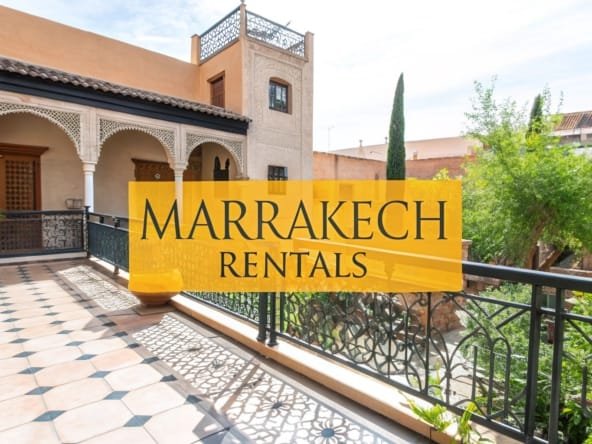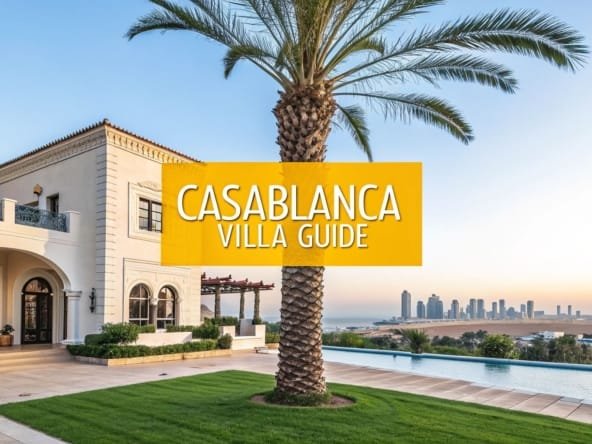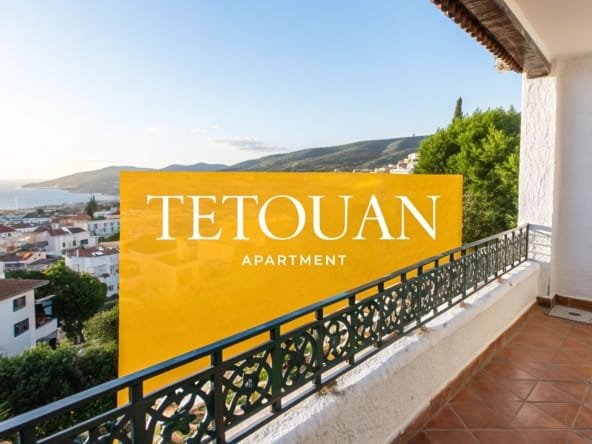Understanding Casablanca's Real Property Market Like an Insider
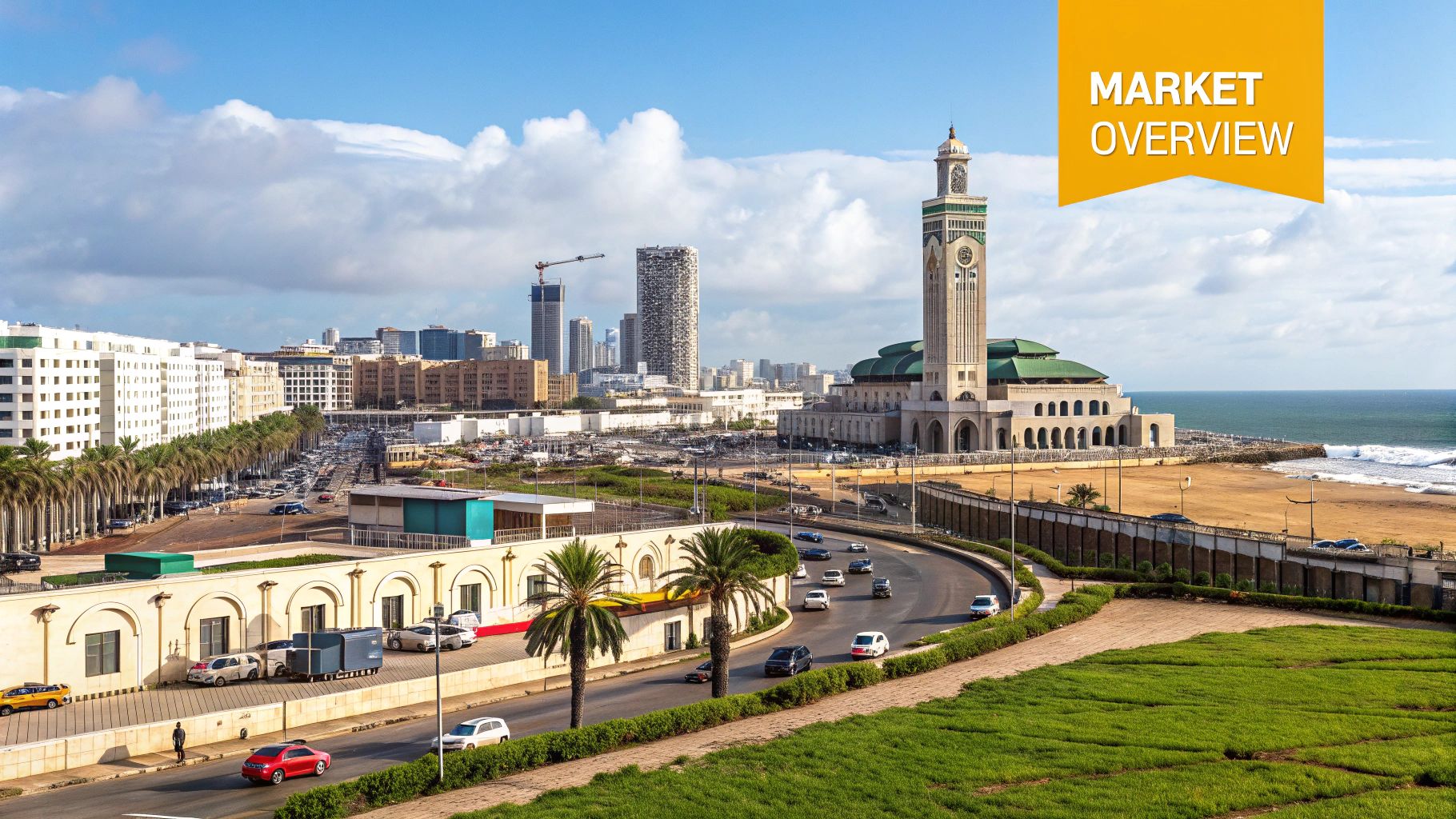
To find the right maison a vendre casablanca, you need to think like a local and look beyond the pretty listing photos. The city's property market isn't a simple equation of supply and demand; it’s a dynamic ecosystem. It’s shaped by big economic trends, ambitious infrastructure projects like the expanding tramway lines, and the constant flow of people moving to Morocco's economic centre. Seeing these forces at play is your first real step toward making a smart investment, not just a purchase.
Instead of just following the buzz around certain "it" neighbourhoods, it’s more effective to look at what's driving the market. For instance, the government's push to establish Casablanca as a top African financial hub creates a steady demand for quality housing, especially from professionals and expats. This directly impacts rental income and property values in areas with good transport links and modern facilities. You might find incredible long-term value in a district just outside the usual prime spots but situated along a new transport route.
Decoding the Price Tags
Getting a handle on current prices is essential. A city-wide average is a useful start, but prices can change dramatically from one street to the next. The real insight comes from looking at recent, confirmed sales data, not just asking prices. For example, recent market reports show a clear upward trend. In 2025, apartment prices sit around 13,900 MAD per square metre, a definite increase from the 13,598 MAD/m² seen in 2024. Villas, particularly in desirable areas like Anfa and Gauthier, are holding strong at an average of 20,500 MAD/m². You can find more detailed price trends across Morocco on Agnez.ma.
This data tells the story of a market that is both stable and growing. It’s less about finding a "cheap" property and more about identifying fair value based on the location, quality, and future growth potential. The reasons for this dynamic growth are varied, and we explore them in more detail in our article on why Casablanca is Morocco's hottest real estate hub.
A Closer Look at District-Level Variations
To give you a clearer idea of what to expect, let's dive into the pricing in some of Casablanca’s most popular districts. This table breaks down current average prices per square metre across popular residential areas, including both luxury and more affordable neighbourhoods. It really shows how your budget can stretch depending on where you focus your search for a maison a vendre casablanca.
| District | Average Price (MAD/m²) | Property Type | Market Trend |
|---|---|---|---|
| Anfa | 22,000 – 28,000 | Luxury Villas & High-end Apts | Stable, high demand |
| Maarif | 15,000 – 19,000 | Modern Apartments | Strong Growth |
| Gauthier | 16,000 – 21,000 | Chic Apartments & Penthouses | Very Strong Growth |
| Ain Diab | 18,000 – 25,000 | Seaside Villas & Apartments | Seasonally Influenced |
| Bourgogne | 13,000 – 17,000 | Mid-range & Older Apartments | Steady Appreciation |
This comparison highlights that while Anfa is still the top tier for luxury, areas like Gauthier and Maarif are seeing significant growth. This is thanks to their blend of modern living, bustling commercial centres, and central locations. Armed with this knowledge, you can shift from being a passive house hunter to a strategic buyer, ready to spot a real opportunity when you see one.
Choosing Your Perfect Neighbourhood Like a Casablanca Native
Finding the right maison a vendre casablanca isn't about scrolling through listings first. The real work begins by thinking like someone who has lived here for years, not just someone visiting for the weekend. Forget the picture-perfect images in brochures; a true Casablancan knows that a neighbourhood's character is revealed in its morning traffic, the hum of its local markets, and the feel of its streets after dark. Your lifestyle, budget, and daily commute are what will truly guide you to the right spot.
For instance, a young professional might crave the energy and convenience of being near the business districts in Maarif or Gauthier. They might be perfectly happy with a smaller apartment in exchange for a lively social scene right outside their door. A growing family, on the other hand, will probably be looking for something entirely different—more green space, reputable schools, and a calmer environment. They might find themselves drawn to the spacious villas in quieter areas, even if it means a longer drive into the city centre. The goal is to find a neighbourhood that doesn't just accommodate your life but actively improves it.
The Reconnaissance Mission: How to Truly Vet a Neighbourhood
To get a genuine feel for a place, you need to do more than just a quick drive-by. You have to put your boots on the ground and experience it firsthand.
- Visit at different times: A neighbourhood can feel completely different at 8 a.m. on a weekday compared to a lazy Sunday afternoon or late on a Friday night. Is it vibrant or quiet? Does finding a parking spot after 6 p.m. become an impossible task? These are the details that paint the real picture of daily life.
- Test the commute: Don't just guess how long it will take to get to work. Actually try the commute during rush hour. That pleasant 15-minute drive you took on a weekend could easily stretch into a 60-minute crawl on a Tuesday morning.
- Talk to the locals: Pop into a local café or strike up a conversation with a shopkeeper. Ask them honestly what they enjoy about living there and what the day-to-day challenges are. This kind of candid insight is priceless and something you'll never find in a property listing.
- Look for future signs: Keep an eye out for construction projects or public development notices. A new tram line, a planned park, or a shopping centre can dramatically increase a neighbourhood's appeal and property values over time, making it a savvy investment.
Lifestyles and Locations: Matching Your Needs to the Right Area
Casablanca is a city of contrasts, offering a wide array of living experiences. It's crucial to understand these differences. For those who want the buzz of the city without sacrificing the calm of the coast, looking at surrounding areas is a smart move. The allure of the ocean heavily influences real estate, especially in nearby regions. Mohammedia is a perfect example, attracting buyers who want a seaside lifestyle but still need easy access to Casablanca's economic hub. For more on real estate trends across the country, you can find great information on Sands of Wealth.
The decision between a modern apartment and a sprawling villa also shapes your lifestyle significantly, from maintenance duties to how you interact with your neighbours. If the idea of more space and privacy appeals to you, it’s worth digging into what villa ownership really entails. If this sounds like your dream, take a look at our dedicated guide on how to choose the perfect villa in Morocco. In the end, securing the right maison a vendre casablanca is about finding a place where your daily life can truly flourish.
Smart House Hunting Strategies That Actually Work
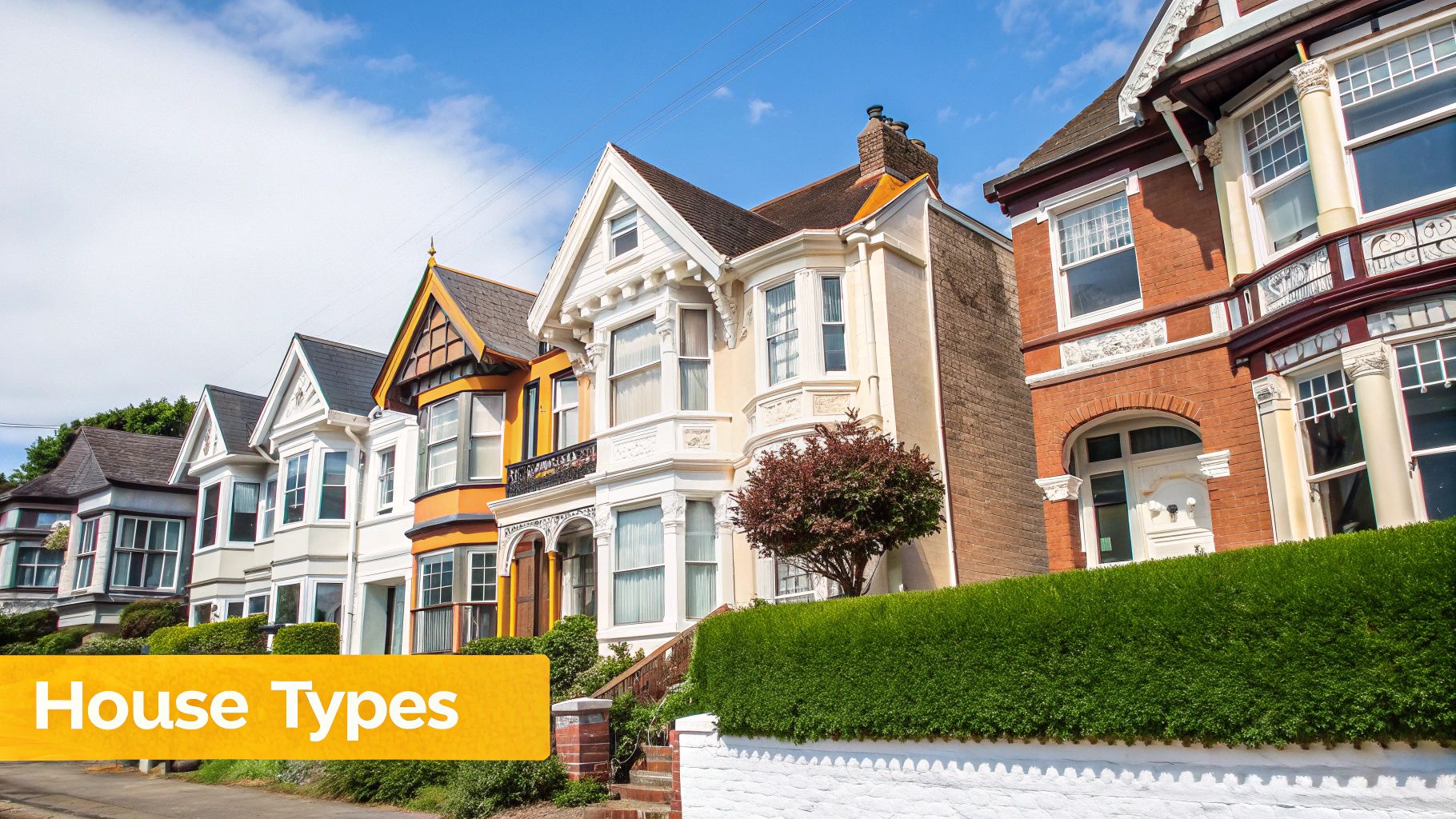
Once you've pinpointed a couple of neighbourhoods you love, the proper search for a maison a vendre casablanca can get underway. While spending hours scrolling through property websites is a common starting point, it's rarely where you'll find the best opportunities. The most sought-after homes are often sold before they even hit the public market. To get a real advantage, you'll need a mix of online searching and good old-fashioned networking.
Start by building relationships with a few well-chosen estate agents who are experts in your desired areas. A good agent is more than someone who just sends you listings; they are your personal scout. They often learn about upcoming properties through their local connections, giving you a valuable head start. Imagine a homeowner in Maarif casually tells their agent they're considering selling in a few months. A sharp agent will immediately think of you if your criteria match, letting you view the place before anyone else knows it's for sale. This kind of insider access is priceless in a fast-moving market.
Mastering the Art of the Viewing
When you finally step inside a potential home, your job is to see beyond the fresh paint and perfectly arranged furniture. You have to assess the property like a detective, looking for clues about its real condition. Cosmetic touches are simple to change, but problems with the structure are a different story. Always focus on the "bones" of the house.
Here’s a practical list of things to check during your viewings:
- Look for dampness: Use your nose first—a musty smell is a big warning sign. Also, check for water stains on the walls or ceilings and peeling paint, especially around bathrooms and the kitchen.
- Inspect the windows: Are they single or double-glazed? Do they open, close, and lock securely? Old or poorly sealed windows can mean higher energy bills and more noise from the street.
- Test the basics: Don't be shy. Flip light switches, turn on the taps to check water pressure, and flush the toilets. You’re not a professional, but catching obvious faults can save you from discovering bigger, costlier issues down the line.
- Assess the structure: Keep an eye out for any large cracks in the walls. While tiny hairline cracks are usually just from the building settling, significant diagonal cracks could point to foundation problems that need an expert opinion.
Recognising True Value vs. Superficial Fixes
It's easy to get excited by a sleek, modern kitchen or a brand-new bathroom, but these are often quick fixes meant to impress buyers. The genuine value is found in the less exciting but more critical features. For example, a home with a recently replaced roof, updated electrical systems, and a well-serviced boiler is a much wiser investment than one with a beautiful kitchen but a crumbling foundation.
Consider which improvements add real, lasting worth. Turning an unused attic into a bedroom or improving the home's energy efficiency are upgrades that offer a return on your investment. In contrast, highly personal or trendy decor might look great to you but won't necessarily raise the property's market price. By prioritising quality and substance over fleeting style, you're better positioned to find a truly exceptional maison a vendre casablanca that other buyers might miss. This careful approach helps ensure you're investing in a solid home, not just a pretty house.
Mastering Financing and Investment Considerations
Sorting out the financial side of buying a property in Casablanca is where your dream of finding the perfect maison a vendre casablanca starts feeling real. This stage is about more than just having a deposit saved up. It’s about getting to grips with the local banking scene, thinking like an investor, and making choices that secure your future. Nail this part, and your purchase will be both affordable and a wise financial move.
Your first port of call should be the local banks to figure out how much you can actually borrow. Big names like Attijariwafa Bank, BMCE Bank (now Bank of Africa), and CIH Bank are well-versed in handling mortgage applications from both Moroccans and foreign nationals. Be aware that their requirements can vary. For example, if you're a non-resident, you might be asked for a larger down payment, often somewhere between 30% and 40% of the property’s value. To make your application as strong as possible, get your paperwork in order early: proof of income, bank statements, and a solid credit history. A mortgage pre-approval doesn't just show sellers you're a serious buyer; it gives you a clear, firm budget to work with.
Evaluating Your Purchase as an Investment
Every property purchase, whether it's your forever home or a buy-to-let, is an investment. Casablanca’s real estate market has seen steady growth, fuelled by interest from both at home and abroad. In 2025, property prices across Morocco have climbed by 3% to 7% annually, with Casablanca leading the charge. You can find more details on these trends in the latest Moroccan price forecasts.
This growth means you need to consider potential returns. Don't just think about property value going up; look at the rental yield, especially in sought-after neighbourhoods. A chic, modern flat in Maarif could bring in a better rental return than a large villa in a quiet suburb, simply because of the high demand from young professionals and expats. The infographic below gives you a snapshot of how prices per square metre differ across key areas.
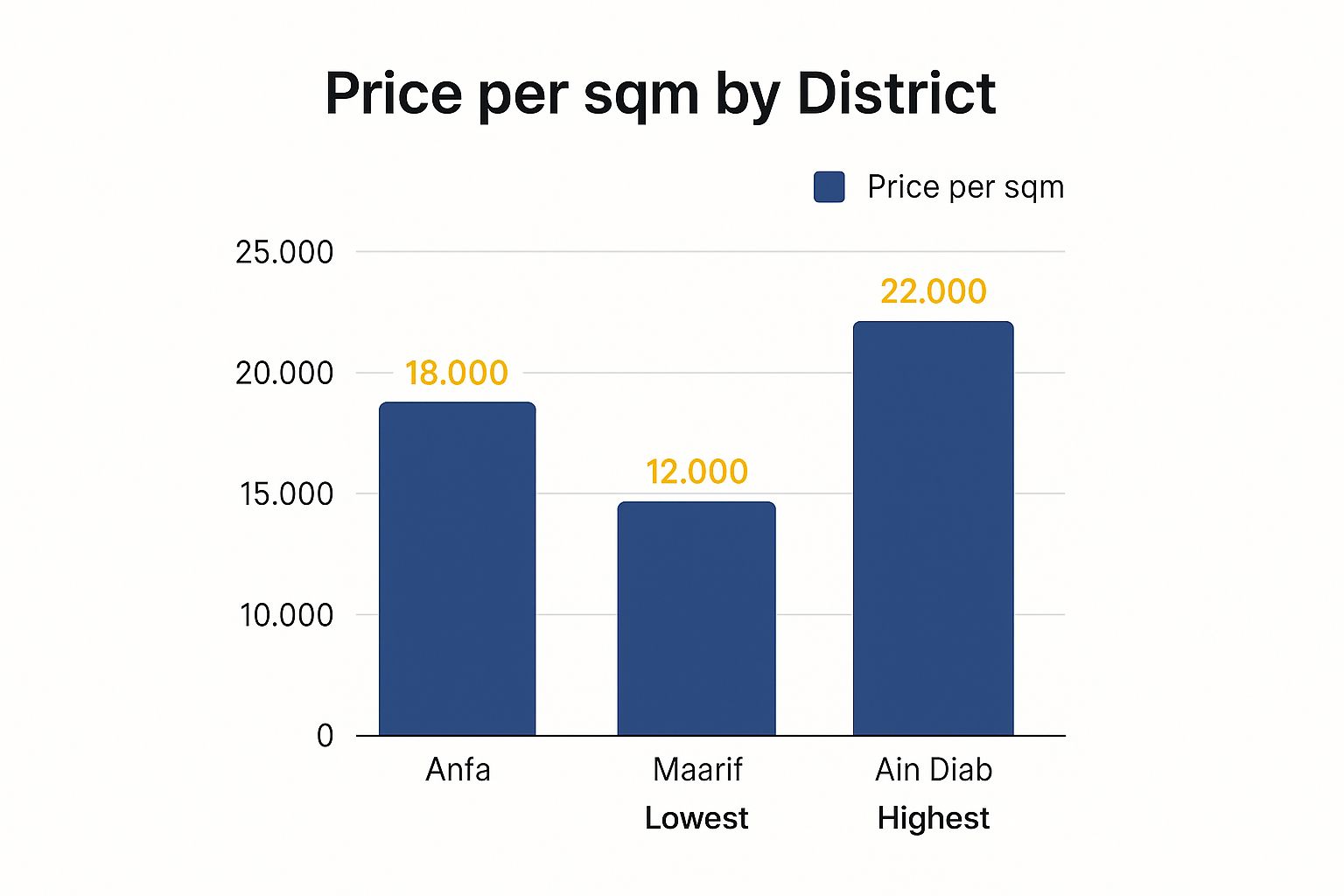
As the chart shows, prime locations like Anfa carry the highest price tags, while areas like Maarif present a more accessible entry point with excellent growth prospects. This kind of data is vital for working out your potential return on investment.
To help you compare what's on offer, here’s a look at the financing options from some of Morocco's main banks.
Financing Options Comparison for Property Buyers
Overview of mortgage products, interest rates, and requirements from major Moroccan banks
| Bank | Interest Rate Range | Minimum Deposit | Processing Time | Special Features |
|---|---|---|---|---|
| Attijariwafa Bank | 4.25% – 5.50% | 20% for residents | 2-3 weeks | Flexible repayment terms, dedicated support for non-residents. |
| Bank of Africa (BMCE) | 4.30% – 5.75% | 20% for residents, 30% for non-residents | 3-4 weeks | Offers "Miftah" loan with fixed and variable rate options. |
| CIH Bank | 4.20% – 5.40% | 15% for young professionals | 2-4 weeks | Known for competitive rates and products tailored for first-time buyers. |
| Société Générale Maroc | 4.40% – 5.80% | 20% standard | 3-5 weeks | Provides comprehensive insurance packages alongside mortgages. |
This table gives you a starting point for your discussions with lenders. Remember that rates can change, and the final offer will depend on your personal financial situation.
Finally, to get a true sense of the cost, you need to factor in all the associated expenses. This includes:
- Notary and registration fees: These usually add up to about 7% of the purchase price.
- Annual property taxes: The amount varies depending on the neighbourhood and the value of your property.
- Maintenance and syndic (building management) fees: These are crucial for maintaining the value and condition of your property, especially in an apartment building.
By carefully balancing your mortgage options with a sharp investment mindset, you can secure a maison a vendre casablanca that not only suits your lifestyle but also helps build your wealth for years to come.
Navigating Legal Requirements and Documentation Like a Pro
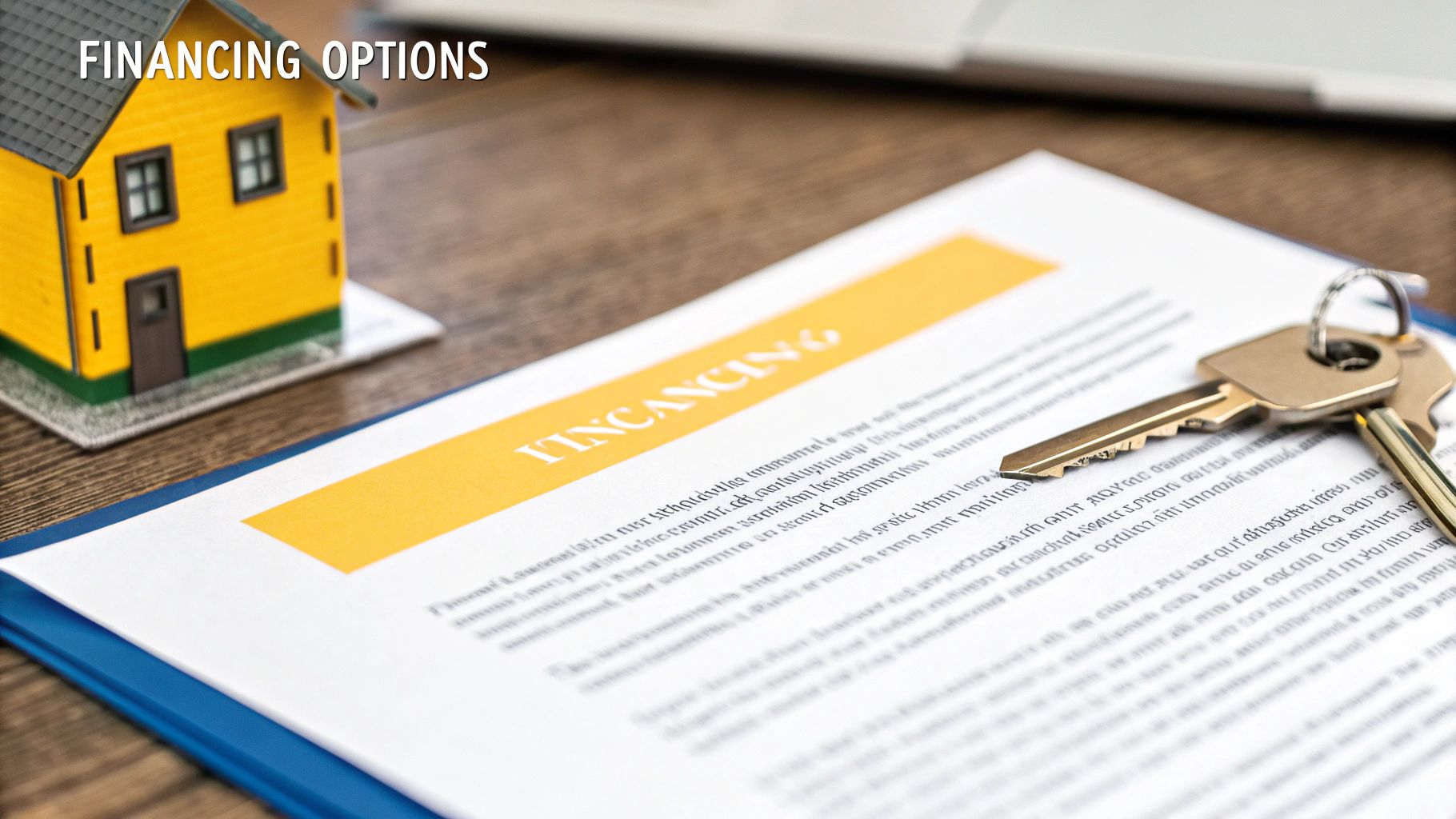
Once you've set your heart on a property, you'll enter the world of Moroccan legal paperwork. This might sound a bit full-on, but it’s a structured process designed to protect you. The most important person in this phase is the notaire (notary). This isn't just any lawyer; a notaire is a neutral legal professional appointed by the state to make sure every part of the transaction is handled correctly. Think of them as your guide and safety net rolled into one.
The first thing your notaire will do is a deep dive into the property's legal history. This means checking the official land registry, the Conservation Foncière, to confirm the seller is the real owner and that there are no hidden debts, mortgages, or legal claims tied to the property. This step is absolutely essential. A clean title check is the foundation of a secure purchase, and you shouldn't proceed without it.
The Core Documentation You'll Encounter
The process revolves around a few key documents. While your notaire will manage the fine print, knowing what each document does will help you feel more in control.
- Compromis de Vente (Preliminary Sales Agreement): This is the first official agreement between you and the seller. It locks in the agreed-upon price and sets out the terms of the sale, including deadlines and any special conditions, like securing financing. You'll typically pay a deposit of around 10% at this point, which the notaire holds securely in an escrow account.
- Acte de Vente (Final Deed of Sale): This is the main event—the final document you sign at the notaire's office. Signing this officially transfers the property into your name. The notaire then registers the deed with the Conservation Foncière, making your ownership official in the eyes of the law.
- Certificat de Propriété (Certificate of Ownership): Once the registration is complete, you'll receive this certificate. This is your ultimate proof of ownership for the maison a vendre casablanca you now call home. Make sure you store this document somewhere very safe.
A potential hurdle, particularly in Casablanca's older districts, involves properties held under a traditional ownership system called "Melkia." These often aren't registered with the modern land registry, which can create ownership ambiguities. It's strongly recommended to focus on properties with a formal Titre Foncier (land title). If you do fall for a Melkia property, your notaire must manage the complex process of converting it to a modern title to ensure your legal security.
The notaire's services are a standard cost in the buying process. You can get a better idea of what to expect by reading our guide to notary fees in Morocco. By choosing a reputable notaire and understanding these key steps, you can navigate the legal side of things with confidence.
Closing Your Purchase and Transitioning to Homeownership
You’ve found the perfect property, and the initial paperwork is behind you—now it’s time to cross the finish line. A smooth closing and an easy move-in hinge on careful coordination and a sharp eye for detail. This is where your hard work pays off, transforming your search for a maison a vendre casablanca into the reality of owning your own home. The best approach is to stay organised and think a few steps ahead.
That final walk-through of the property is a moment you can't afford to rush. This isn’t just one last look for sentimental reasons; it's your final opportunity to make sure everything is exactly as stated in the compromis de vente. Double-check that all agreed-upon fixtures are in place and that no new damage has appeared since you last saw it. If the seller promised to make specific repairs, confirm they've been done properly. It's much easier to address an issue now than after you have the keys.
Managing the Final Steps and Costs
As your closing day gets closer, you'll be working closely with your notaire to finalise everything. They will send you a final statement of funds detailing the remaining balance on the property and all the associated costs. These closing costs, which usually come to around 7% of the property's price, cover notary fees, property registration taxes, and other administrative charges. Getting this precise number ahead of time lets you prepare the funds and avoid any last-minute financial scramble.
Once the final deed, or acte de vente, is signed at the notaire's office, you are officially the legal owner. But the process isn’t quite over. Now, it's time to manage the practical side of moving in.
- Utilities Transfer: Get in touch with the utility providers for water and electricity (Lydec) and your chosen internet service well before your move-in date. Setting up accounts in your name can take a few days, and you don’t want to be without essentials when you first arrive.
- Property Insurance: Getting homeowner's insurance, known as assurance multirisque habitation, is more than just a good safety net—it’s often a condition of your mortgage. Make sure your policy is active from the day you take ownership.
- Initial Maintenance Check: With keys in hand, it’s a good idea to have a professional inspect key systems like the boiler, air conditioning, and plumbing. This proactive check can save you from dealing with expensive emergency repairs down the road.
Life After the Purchase
If you bought your Casablanca property as an investment, looking into property management services is a wise next step. A good management company can take care of finding tenants, collecting rent, and handling maintenance, turning your property into a straightforward source of income. If you're moving in yourself, becoming part of the local community is essential to feeling at home. Introduce yourself to your new neighbours, explore the local shops and cafes, and join community groups to quickly feel like you belong.
Your Complete Roadmap to Casablanca Property Success
Let's pull everything together into a clear, actionable plan for your property journey. Think of this as your personal checklist for making a smart move in the Casablanca market. Finding the right maison a vendre casablanca is less about luck and more about a methodical approach. This roadmap boils down the most important insights from our guide, giving you clear steps, realistic timelines, and potential red flags to watch for, from your first thoughts to the moment you get the keys.
The whole process, from initial research to closing the deal, can realistically take anywhere from three to six months. Sometimes it takes longer, especially if financing or legal matters get complicated. The key is not to rush; a well-thought-out purchase is a secure investment. Let's break down the journey into key stages.
Phase 1: Market Immersion and Financial Readiness (Weeks 1-4)
Your journey starts with education, not property viewings. Before you even glance at a listing, you need to get a firm grip on the financial and market landscape.
Your Actionable Checklist:
- Deep Dive into Market Data: Don't just look at asking prices. Get into the details of price trends in neighbourhoods you're considering, like Anfa, Maarif, or Gauthier. It's crucial to understand the gap between what's listed and what properties actually sell for. For example, a property advertised at 2.5 million MAD might realistically sell for 2.35 million MAD after some negotiation.
- Secure Mortgage Pre-Approval: This is a non-negotiable first step. Talk to Moroccan banks like Attijariwafa Bank or CIH Bank to find out exactly how much you can borrow. A pre-approval letter does more than just set your budget; it shows sellers you're a serious buyer.
- Calculate Your True Budget: The property price is just one part of the equation. You need to account for notary and registration fees, which are roughly 7% of the sale price. Also, factor in potential renovation costs and ongoing expenses like property taxes and syndic (building management) fees. For a 2 million MAD apartment, you should have an extra 140,000 MAD set aside for these closing costs.
What success looks like: You have a solid, pre-approved budget. You can confidently discuss the market trends of at least two Casablanca neighbourhoods. You've also got a detailed spreadsheet outlining all potential costs.
Phase 2: Strategic Search and Diligent Viewings (Weeks 5-12)
With your finances in order, the active search can begin. This is where your neighbourhood research and a keen eye for detail become your most valuable tools.
Your Actionable Checklist:
- Build Your "A-Team": Connect with a reputable estate agent who genuinely specialises in your chosen area. A great agent can give you access to properties that aren't even publicly listed. At the same time, find a trusted notaire (notary) to have ready for when you need legal checks.
- Conduct Smart Viewings: When you visit a property, look past the stylish furniture. Focus on the essentials. Check for any signs of damp, test the water pressure, examine the quality of the windows, and inspect for any structural cracks. Take plenty of photos and detailed notes so you can compare properties later.
- Analyse the Neighbourhood: Don't just visit once. Spend time in your target area at different times of the day and week. See what the morning rush is like, how quiet it is in the evening, and what the atmosphere is on a weekend. Is parking a constant battle? Are the local shops and cafes genuinely convenient? A quick chat with a local shopkeeper can often tell you more than any property brochure.
What success looks like: You've viewed at least five to ten properties and can clearly state the pros and cons of each. You have a trusted agent and notaire saved in your contacts. You have a shortlist of two or three strong contenders.
Phase 3: Due Diligence, Negotiation, and Closing (Weeks 13-24+)
This is the most critical stage, where all the legal and financial details are hammered out. Patience and attention to detail are your best friends here.
Your Actionable Checklist:
- Initiate the Legal Checks: Once you've made your choice, your notaire steps in. They will conduct a thorough title search at the Conservation Foncière (Land Registry) to make sure the property is free of debts or legal disputes. This is an absolutely essential step, particularly for older properties that might not have a modern Titre Foncier (title deed).
- Negotiate and Sign the Compromis de Vente: This is the preliminary sales agreement that locks in the price and any conditions. Your agent will help you with negotiation strategy based on current market realities. Once it's signed, you'll pay a deposit, usually 10%, which is held in a secure escrow account by the notaire.
- The Final Walk-Through and Closing: Just before signing the final Acte de Vente (deed of sale), do one last inspection of the property to ensure everything is as you agreed. At the closing appointment, the notaire will oversee the transfer of funds and officially register the sale. Congratulations, the property is yours!
- Post-Purchase Logistics: Don't delay on this. Immediately begin the process of transferring utility bills into your name and arrange for homeowner’s insurance, known as assurance multirisque habitation.
What success looks like: You are holding a clear title certificate (Certificat de Propriété). The keys to your new maison a vendre casablanca are in your hand, and all utilities and insurance policies are officially in your name.
This roadmap provides a solid framework for what can often feel like a complicated process. By tackling each stage one by one, you turn a big challenge into a series of manageable steps, moving you confidently towards your dream home in Casablanca.
Navigating this journey is easier with a knowledgeable partner. At Rich Lion Properties, we're here to guide you through every stage with expert advice and dedicated support. Explore our services and let us help you find your perfect Moroccan property.

